My Mental Health and Archery – by Jenny Collins
13th July 2020Some of you will have met me on the shooting line over the last couple of years and some of you may remember me as a precocious ginger kid in the 1990s. But what most people don’t realize is that it took a pretty big life event to come back to archery in 2017.
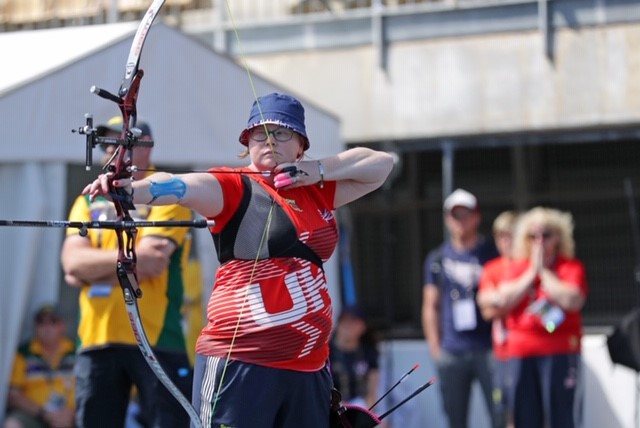
In 2015 I was a member of the RAF and hoping for a promotion, married to another service person with two amazing children. Outwardly I was showing a confident, focused approach to my work ensuring spares and logistics support were provided to the Chinook Helicopter Force and personally I appeared pretty sorted. Inwardly I was struggling; not sleeping; unable to make decisions and feeling so anxious I was nearly physically sick on a daily basis – and this was just the tip of the iceberg. Later in the year I was signed off sick for a couple of weeks to ‘rest’ and never went back to work. Supported by the Military Mental Health Services I unpicked the events that had led to a diagnosis of depression and anxiety. There is no war story about my service in Afghanistan to explain the cause, it was the years of dealing with other people’s welfare and personal struggles that had mounted up and caused my brain to implode.
I wrote the below article for the RAF’s Sports Magazine in 2018 and it describes how archery helped me regain control of my life and start to look forward again. Focusing on the process of each arrow, protected by an imaginary bubble, I was able to ‘be in the moment’, be in control and my mind was calm – for the first time in years.
If anything I have written has touched a cord, or things are getting too much – please reach out to someone – we are not designed to function in a vacuum, and there are so many organisations out there ready to help.
What’s your Gold Medal?
“I am the master of my fate,
I am the captain of my soul.”
For many William Earnest Henley’s poems will forever be linked to Prince Harry’s Invictus Games. It offers a symbolic set of words to describe the essence of the multi-sport, adaptive games initiated in 2014. For the hopefuls and the lucky ones selected, the poem has deeply personal meanings that are as varied as the competitors themselves.
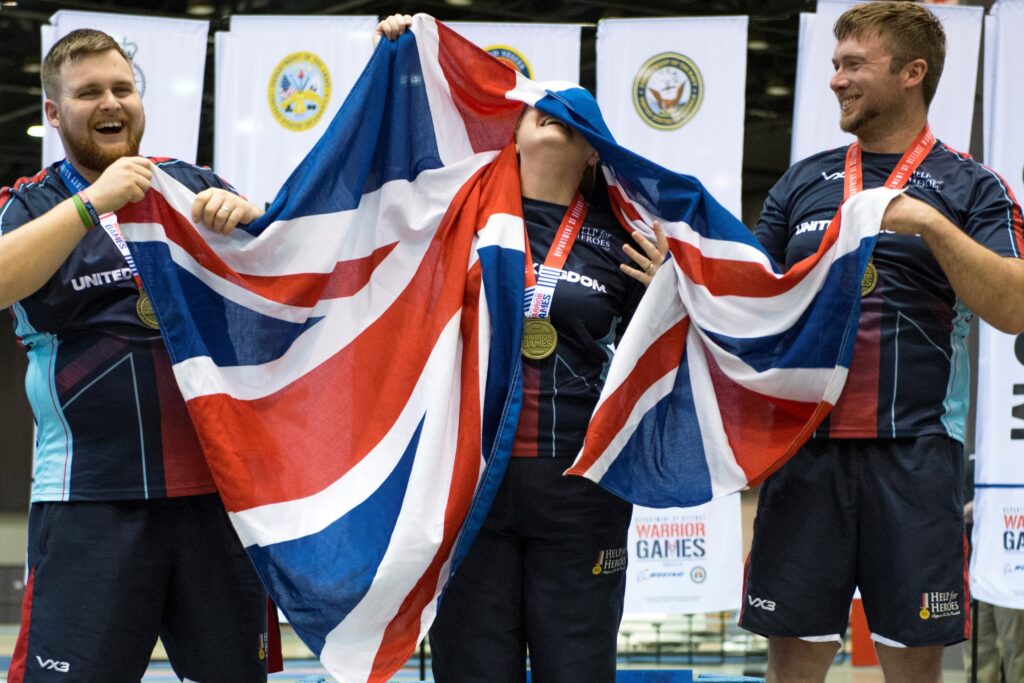
In 2018 over 1200 qualifying personnel registered an interest in competing in Sydney. At the end of the selection process, 451 were hopeful of a place in the 72 strong UK team. This was a far cry from the first games in London 2014, when Team UK selection was almost a case of saying “I’ll give it a go”. Why the change? Some will say it is the media coverage, the chance to meet Prince Harry or even the lure of a foreign trip for you and your family. Ask the hundreds of wounded, injured or sick (WIS) serving and veteran personnel and they will describe something much deeper.
I have been involved in the Sports Recovery/Team UK cycle since March 2017. Like many sufferers of mental health illnesses and female WIS personnel, I could not see how getting involved in competitive sport would help me. How would being in an environment with ‘proper’ WIS help me? Surely being in crowded areas with assertive, strong individuals would shine a spotlight on my own insecurities and issues? And, of course, I was setting myself up for failure and rejection when I was inevitably not selected….
—x—
I had competed at International level in archery prior to joining the RAF; however, the thought of shooting again made me cold at the suggestion. Encouragement from past coaches (now involved in Help for Heroes archery) and people I am now privileged to call close friends led me to take part in a training session and trials in March/April 2017. Walking into that sports hall was one of the hardest things I have done. Pushing open the door took me from the safe, cocoon of my sofa where I dictated how I interacted with the world into the unknown. I was going to have to stand on a shooting line with people I didn’t know, next to people who deserved to be in the process. I was just diagnosed with a handful of a mental health conditions; they had lost limbs or were wheelchair-bound due to proper service incidents. I was certain it was going to be yet another misadventure and further confirmation of why I was being medically discharged.
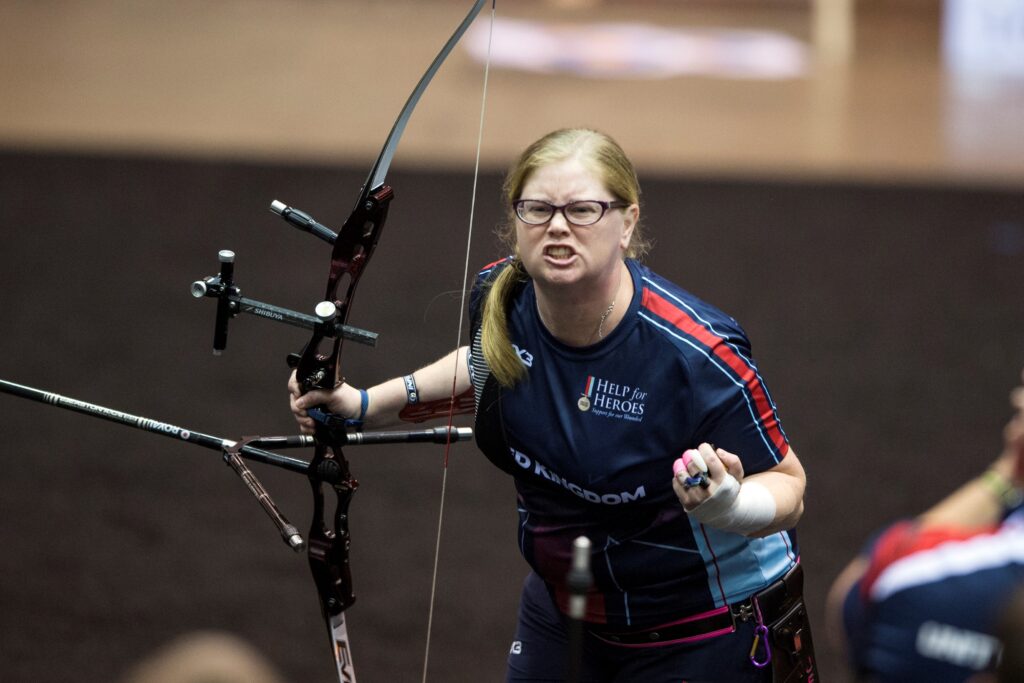
Did I enjoy that first session? Yes but no. Yes, it was nice to focus on something other than my illness, it was fun to have a joke with people who had shared experiences (or at least they were poking fun at the RAF) and chatting to the coaches who I had known in a previous life was refreshing. No, because I realized I wanted to be selected, I wanted to prove I wasn’t a right-off, I wanted to show my family I was more than the snotty, blubby mess they shared a house with. I wanted to be part of this, I wanted to be involved, I wanted to get back to Jenny and, my god, that was scary.
—x—
“Collins 10…McKinley 10
Collins 8…McKinley 8
This is the last arrow…Collins 9…McKinley 8”
I’d won. I had won the archery gold in the Invictus Games 2018 in the Sydney Olympic Park. There were people cheering, cameras clicking, TV crews hovering, commentators shouting out our scores and my family watching from the stands. I had willingly put myself in the centre of all that and even though I had piled on the pressure by taking the match to a 5th set, struggled to sleep the night before, suffered food poisoning and flown to the opposite side of the world, but I’d enjoyed it. A far cry from March 2017 when I wouldn’t even enter a sports hall and was convinced this was all a big mistake. Not only had I won individual gold, more importantly, we had won team bronze for archery too.
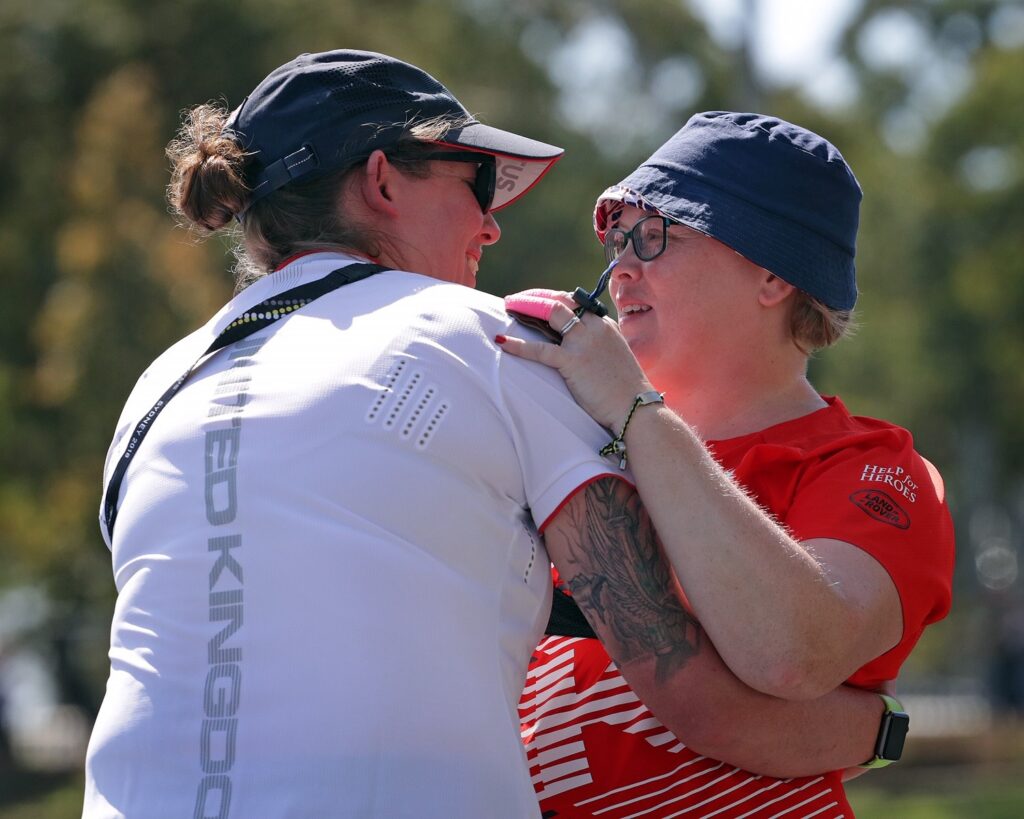
That is the essence of Invictus. It allows you to see that what you are convinced is impossible, is a point of view that you are in control of. The only time your injury or illness is a factor is to check your eligibility and classify you. The rest of the time it is irrelevant. You are encouraged to consider your recovery journey in terms other than a gold medal. For some, as it was for me in 2017, the gold medal is just getting into that sports hall. I then progressed to the medal by competing in the Warrior Games in 2017 without constantly crying. In November 2017 it was committing to a proper training program and joined a civilian archery club. When 2018 came the gold was applied to Sydney and properly going for it – even though I knew the chances of selection were slimmer than ever. I was slowly moving away from my safe but insular sofa into the world and getting closer to being Jenny again. 2018 was going to be the year I was going to contribute, I was going to support others. I was going to be the inspiration.
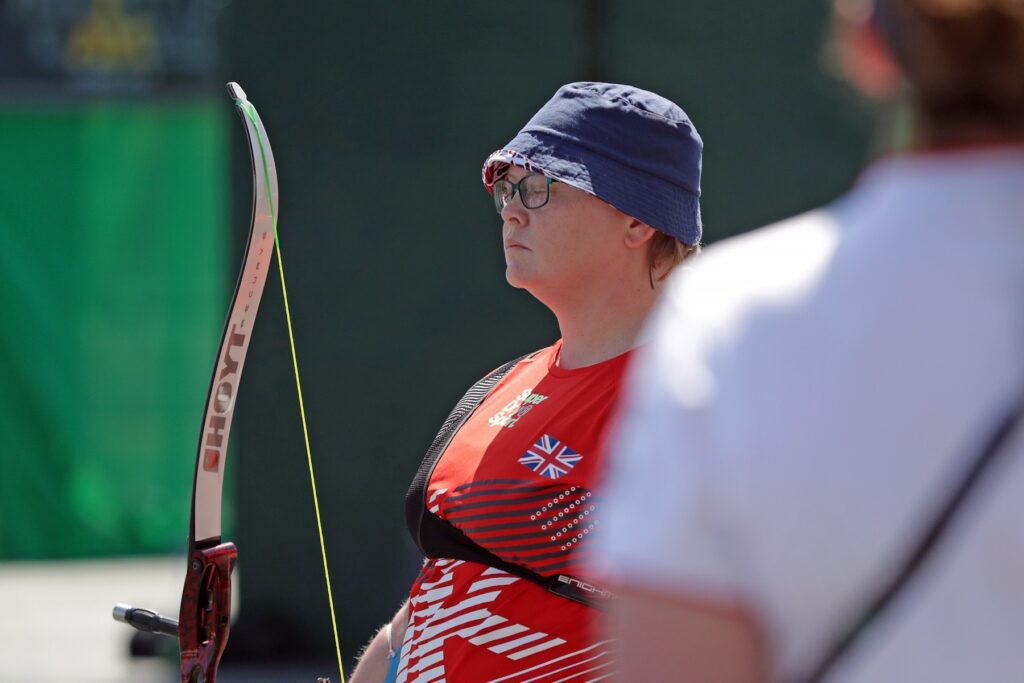
What had changed? Where did this positivity come from? In actual fact it had always been there, it had just been buried under the medicalisation of my feelings, the medical board that deemed me no longer fit to serve, the embarrassment of having a mental illness, the constant cycle of medication reviews and counselling appointments. The Help for Heroes Sports Recovery Program has allowed me to clear away the fog and focus on what is central to my health and recovery. The success of the program is that while you are focusing on a sport you are subtly working on yourself and moving towards the ultimate gold medal – recovery.
For me, Invictus is the empowerment to set a goal and start taking small, positive steps towards it. It’s the friendships I get support from, but more importantly, give support to. I have something I am proud of and I am no longer defined by my diagnosis. I have regained control of my fate and the ownership of my soul. I am Invictus, but more importantly, I am Jenny Collins again.




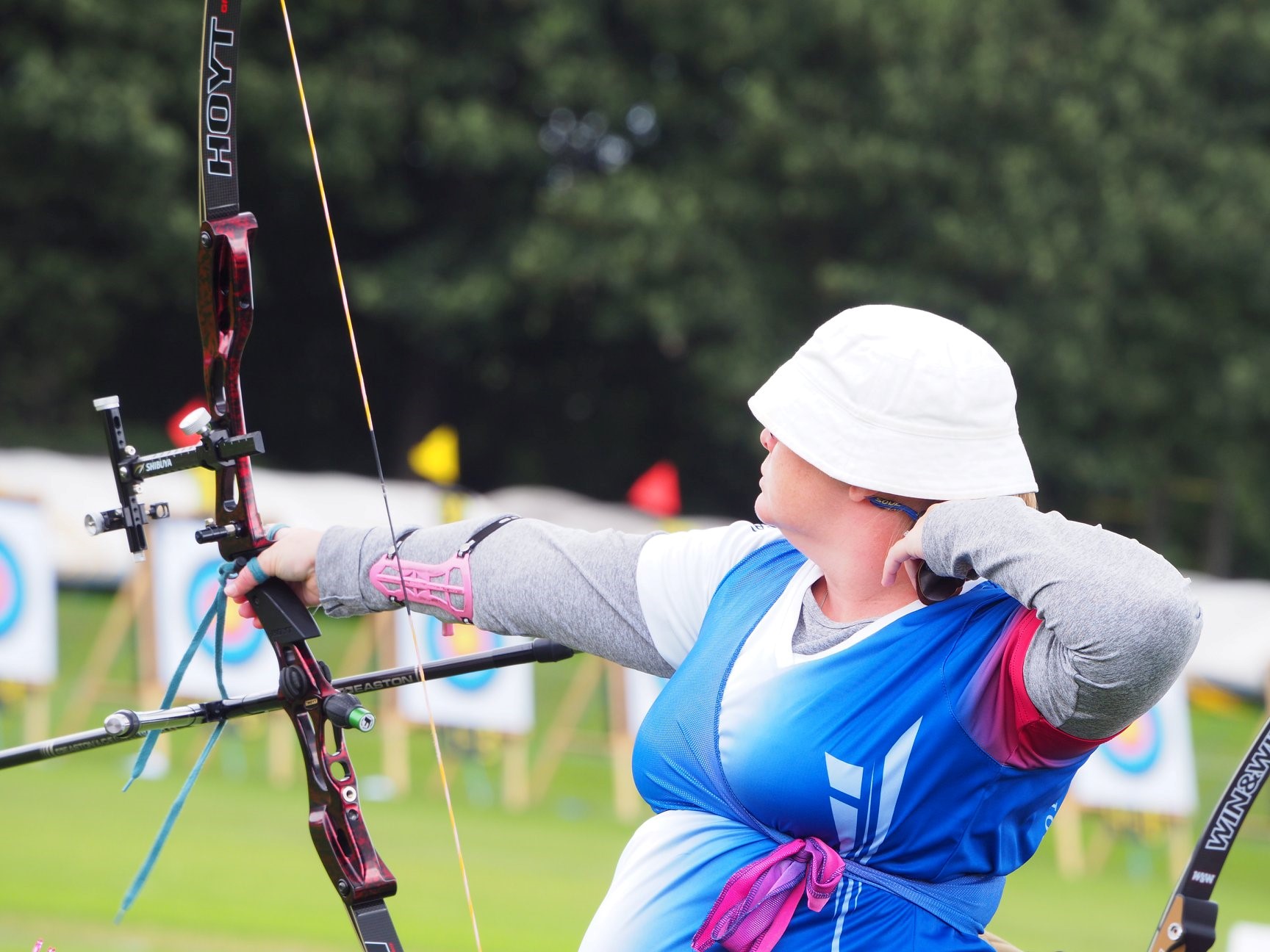 I started shooting in 1992 with Links Archers in Scotland. About 18 months after I started shooting SAA were short of girls for the Scottish Junior Team, so at age 14 I started shooting 70m with a one piece wooden bow (a Greenhorn GreenKat) that stacked like mad and I had about 24lb on my fingers! I made my first junior team in 1995 (now shooting a KG1), Scottish Senior Team in 1996 and British Squad in 1997 (I shot over 1200 for a Ladies WA 1440 with a KG1 at about 30lbs and X7 arrows). I represented GB in Czech Republic, the USA and Italy.
I started shooting in 1992 with Links Archers in Scotland. About 18 months after I started shooting SAA were short of girls for the Scottish Junior Team, so at age 14 I started shooting 70m with a one piece wooden bow (a Greenhorn GreenKat) that stacked like mad and I had about 24lb on my fingers! I made my first junior team in 1995 (now shooting a KG1), Scottish Senior Team in 1996 and British Squad in 1997 (I shot over 1200 for a Ladies WA 1440 with a KG1 at about 30lbs and X7 arrows). I represented GB in Czech Republic, the USA and Italy.

